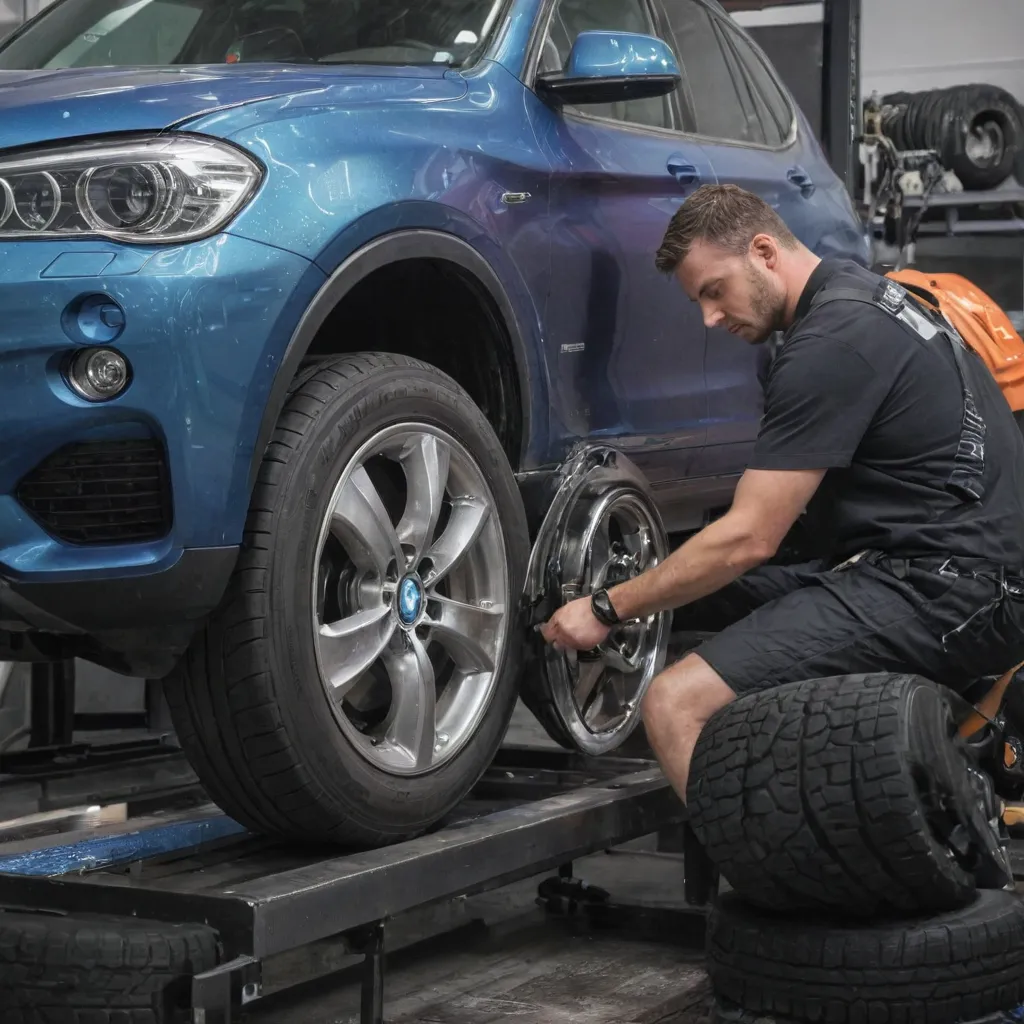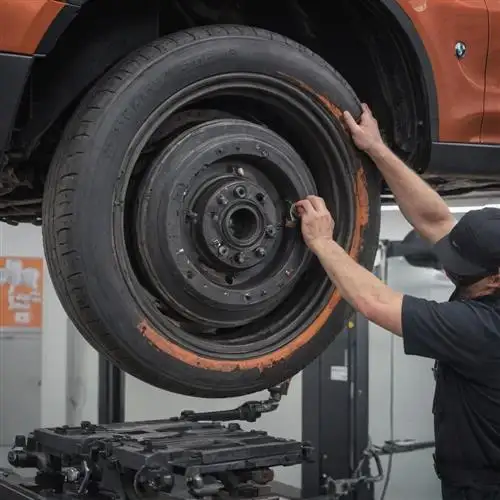
Routine Maintenance Matters
Maintaining your BMW X3 is crucial to ensuring its longevity and peak performance. Regular servicing and attention to essential components can save you from costly repairs down the line. One of the most important aspects of routine maintenance is keeping up with the manufacturer's recommended service schedule. This typically includes oil changes, tire rotations, and fluid flushes at specific mileage intervals.
Oil changes are crucial for the health of your X3's engine. Using the recommended oil type and changing it at the specified intervals can help prevent sludge buildup and ensure your engine runs smoothly. Neglecting oil changes can lead to premature wear and even engine failure.
Tire rotations are another essential maintenance task. By regularly rotating your tires, you can maximize their lifespan and ensure even wear. This can improve your vehicle's handling, fuel efficiency, and safety. Furthermore, proper tire pressure monitoring and adjustment can impact your X3's performance and fuel economy.
Fluid flushes, such as for the transmission, brake, and cooling systems, are also important. These fluids break down over time and can become contaminated, leading to potential issues. Replacing them at the recommended intervals helps maintain the integrity of your X3's systems and prevents more serious problems.
In addition to scheduled maintenance, it's essential to stay vigilant for any signs of potential issues. Pay attention to warning lights, unusual noises, or changes in your X3's handling or performance. Addressing these concerns promptly can help prevent more extensive and costly repairs.
Fluid Flush and Filter Swap
Maintaining the fluids and filters in your BMW X3 is crucial for its longevity and optimal performance. Regular fluid flushes and filter swaps can help prevent costly repairs down the line. Here's a comprehensive guide on how to tackle this essential task:
Engine Oil and Filter Change: BMW recommends changing your engine oil and filter every 10,000 miles or 12 months, whichever comes first. Use only BMW-approved fully synthetic oil and OEM filters to ensure compatibility and quality. Proper oil changes can Transform Your BMW X3 Into A High-Performance Beast by keeping the engine lubricated and clean.
Transmission Fluid Flush: The transmission fluid in your BMW X3 should be flushed every 30,000 miles or 24 months. This helps remove contaminants and ensures the fluid retains its lubricating properties, preventing premature wear on the transmission components.
Differential Fluid Swap: Both the front and rear differentials in your BMW X3 require fluid changes every 30,000 miles or 24 months. Neglecting this maintenance can lead to differential failure, a costly repair. Use the recommended BMW fluid and replace the entire fluid volume for best results.
Brake Fluid Flush: Brake fluid is hygroscopic, meaning it absorbs moisture over time. This can lead to a lower boiling point and decreased braking performance. Flush the brake fluid every 2 years to maintain optimal braking.
Coolant Flush: The coolant in your BMW X3 should be flushed and replaced every 4 years or 50,000 miles. This helps prevent corrosion and ensure efficient heat transfer, protecting your engine from overheating.
Air Filter Replacement: Replace the engine's air filter every 30,000 miles or as needed. A clogged air filter can restrict airflow, reducing engine performance and fuel efficiency.
Cabin Air Filter Swap: The cabin air filter should be replaced every 15,000 miles to ensure clean air circulation in the cabin and maintain the effectiveness of the HVAC system.
Brake System Tune-up
Maintaining the brake system of your BMW X3 is crucial for ensuring safe and reliable performance. The brake system is a complex network of components that work together to provide smooth, responsive braking. Regular tune-ups can help extend the life of your brakes and prevent costly repairs down the line. In this section, we'll dive into the key steps to keep your BMW X3's brake system in top shape.
First and foremost, it's essential to inspect your brake pads regularly. The brake pads are the components that press against the brake rotors to slow and stop your vehicle. Over time, these pads will wear down, and they need to be replaced to maintain optimal braking performance. Check your owner's manual for the recommended replacement interval, and be sure to have your brake pads inspected by a qualified technician during routine maintenance visits.
In addition to the pads, the brake rotors play a critical role in the braking system. The rotors are the large, disc-shaped components that the pads press against. Over time, the rotors can become warped or worn, reducing their ability to dissipate heat and causing uneven braking. During a brake system tune-up, have your technician inspect the rotors and resurface or replace them if necessary.
The brake calipers are another vital component that should be checked during a tune-up. The calipers are the "clamps" that hold the brake pads in place and apply pressure to the rotors. If the calipers are not functioning correctly, it can lead to uneven brake wear and decreased braking performance. Your technician should inspect the calipers for any signs of sticking, leakage, or other issues and repair or replace them as needed.
The brake fluid is also a critical component that requires attention during a tune-up. Over time, the brake fluid can absorb moisture, which can reduce its effectiveness and lead to corrosion within the brake system. It's recommended to have your brake fluid flushed and replaced at regular intervals, as specified in your owner's manual.
Finally, don't forget to have your brake system components checked for any signs of wear or damage. This includes the brake lines, hoses, and hardware. Your technician should inspect these components for any signs of leaks, cracks, or other issues and make necessary repairs to ensure the overall integrity of your BMW X3's brake system.
Suspension Alignment and Inspection
Properly maintaining the suspension system of your BMW X3 is crucial for ensuring a smooth and safe driving experience. The suspension alignment and inspection process involves meticulously checking various components to ensure they are functioning within manufacturer specifications. This not only enhances the vehicle's handling and stability but also extends the lifespan of the suspension components.
One of the primary aspects of suspension alignment and inspection is the wheel alignment. The BMW X3's suspension is designed to provide optimal balance and handling, but over time, the alignment can become misaligned due to various factors such as hitting potholes, worn components, or changes in the vehicle's weight distribution. A professional technician will use specialized equipment to measure the vehicle's alignment angles, including camber, caster, and toe, and make the necessary adjustments to bring them back into the recommended range.
Another important aspect of suspension inspection is the shock absorbers and struts. These components play a vital role in providing a comfortable and controlled ride by absorbing the impacts from the road. Over time, the shock absorbers and struts can wear down, leading to a bouncy or unstable ride. A thorough inspection will involve checking the condition of these components and determining if they need to be replaced.
In addition to the shock absorbers and struts, the suspension system also includes components such as control arms, ball joints, and bushings. These parts can wear out over time, causing issues with the vehicle's handling and stability. A comprehensive suspension inspection will involve checking the condition of these components and ensuring they are functioning as intended.
Tire Rotation and Replacement
Proper tire management is essential for the BMW X3, ensuring optimal performance, fuel efficiency, and safety. Rotating your tires at the recommended intervals not only extends their lifespan but also helps maintain the vehicle's handling and stability. When it comes time to replace the tires, understanding the nuances of the process can make all the difference.
The BMW X3's all-wheel-drive system places unique demands on its tires. Front and rear axles experience different levels of wear, leading to uneven tread depth over time. Rotating the tires as per the manufacturer's recommendations (typically every 5,000-7,500 miles) helps mitigate this issue, promoting even wear and maximizing the tires' useful life. This simple yet effective maintenance task can save you money in the long run by delaying the need for a full tire replacement.
When the time comes to replace your BMW X3's tires, it's essential to select the appropriate size, load rating, and speed rating. Sticking to the original equipment manufacturer (OEM) specifications ensures optimal performance and compatibility with the vehicle's systems. Additionally, consider factors like tread design, wet weather performance, and noise levels to tailor the tires to your driving preferences and local conditions.
Proper tire alignment and balancing go hand-in-hand with tire rotation and replacement. Misaligned wheels can cause uneven wear, reduced fuel efficiency, and compromised handling. Similarly, imbalanced tires can create vibrations and accelerate wear. Ensure your BMW X3's wheels are aligned and tires are balanced during each tire rotation or replacement to maintain the vehicle's optimal performance and ride quality.
- Regularly inspect your tires for signs of wear, such as uneven tread depth or cracks in the sidewall.
- Keep your tires properly inflated to the recommended psi, as specified in your owner's manual.
- Avoid exposing your tires to extreme temperatures, direct sunlight, and other environmental factors that can accelerate aging and deterioration.
- Consider investing in a tire pressure monitoring system (TPMS) to stay informed of any air pressure issues.
















